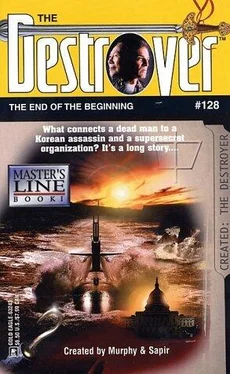With a force of will far older than his years, he blinked away the image. His teacher insisted that emotions were for the weak. He would not be weak.
Reaching down, he removed the dead man's pocket watch.
Burying the brief hint of human emotion he'd allowed to seep to the surface, the boy turned from the body and padded back into the shadows. He left the stable through a back door. To find his Master.
Chapter 21
For Dr. Harold W. Smith the wait had been going on for five agonizing days. Five days of reading the papers. Five days of checking the daily computerized reports from CURE's hundreds of unwitting employees in federal law enforcement. Five days of waiting for that one, final, fateful call on the new dedicated White House line.
Smith expected this to be the end. He assumed the connection would be made between MacCleary, Folcroft and, eventually, CURE. If not in the papers, he assumed he'd see it in the secret reports from the CIA or FBI. As soon as the President got a whiff, he would make the call.
It was the one control the nation's chief executive had over the covert agency. He could only suggest assignments; he couldn't command Smith into the field. But he could order the organization to disband.
If CURE had indeed been compromised, Smith assumed the President would hear about a rogue agency operating in Rye during his daily intelligence briefing. He would then calmly excuse himself from his meeting and-after the door was shut-run like mad to give Smith the order to disband before legitimate federal law-enforcement agencies arrived at Folcroft's gates with battering rams and tear-gas canisters.
But for the five days since Remo had been sent to deal with MacCleary and the Viaselli situation, the secluded road out beyond Folcroft's high front wall had remained quiet. Spring buds were bursting open on the maple trees that lined the lane. Cheerful squirrels cavorted in the branches. There was no sign of tanks or armed federal agents. Still, as he toiled behind his desk, he found one eye straying more and more regularly to the window. He half expected to see armed agents swarming the back lawn of Folcroft.
Remo called to check in twice during this time of high crisis. The first was after the story of the suicidal man with the hook appeared in the local papers.
Smith complimented Remo on his work at the hospital. Remo sounded violent on the phone, vowing to bring back the mysterious Maxwell's head in a bucket in five days.
Only one more call. This time asking Smith for three thousand dollars to buy an engagement ring for Norman Felton's daughter. Remo explained that he was romancing the flighty young girl to get close to her father and, hopefully, to Maxwell, the Viaselli man behind Felton.
That was it. Dead silence afterward. Five days of waiting without knowing.
During that time, Smith did his best to put MacCleary out of his mind. Logically, he knew that it would do no good to dwell on it. Yet his mind couldn't let it go.
One of CURE's own was gone.
Remo was an add-on to the agency. It had been difficult arranging his execution, but he was replaceable if necessary. Chiun was just his temporary trainer. They weren't part of the inner circle. MacCleary had been there from the start.
Conrad MacCleary. The only real friend Harold W. Smith had ever had. Dead.
"America is worth a life."
How many times had MacCleary uttered those words. One of the last great patriots, the hard-drinking agent had said it most passionately over the past eight years. It invariably came up when he was arguing the necessity for CURE to have an enforcement arm that was sanctioned to kill.
At no time had MacCleary ever thought he would be that enforcement arm's first victim. It was ironic, yes. But MacCleary loved irony, lived to find humor in the absurd.
There was no doubt that if he could, Conrad MacCleary would be sitting on the couch across the room clutching his sides and laughing that bellowing laugh of his over the circumstances of his own death. But the sofa was empty.
Unlike his deceased friend, Harold Smith found nothing humorous about death. Not MacCleary's, and certainly not the ones he was reading about this morning.
Two more United States senators were dead.
The details of Leonard Albert O'Day's death weren't complete at the moment, but they were clear enough. He had been found in the stable on his estate. His four major joints, along with his skull, had been crushed. The coroner was speculating that he had been stomped to death by one of his own horses.
Leonard O'Day had just been joined by Senator Calvin Pierce of Connecticut.
Senator Pierce's body had been found at the apartment of his mistress. The girl was dead, as well. According to the earliest reports, the bodies had been mutilated almost beyond recognition. Somehow the killer had hurled the two victims against each other with such force that their bodies became intertwined. It was a ghastly trick, obviously. The forensics experts were quietly saying that it would be almost impossible to cut the two bodies apart.
The condition of the senator's body would make the arrangements difficult for the senator's widow. Mrs. Pierce had already released a statement through her lawyer saying that, given her husband's years of public service, she expected no less than a state funeral in Washington.
As he read the reports, Smith felt a curl of ice slither like a frozen serpent up his rigid spine.
Two more senators had been murdered. Coincidence was unlikely in the extreme. Coming just a week after the murder of Senator Bianco it could only mean one thing. Some unknown force was systematically removing members of the United States Senate.
It was almost too much for the CURE director to contemplate. Smith was immersed in the latest data on Senator Pierce's death when the blue contact phone jangled to life.
Tearing his eyes from his computer monitor, he checked his watch even as he picked up the bulky receiver. Just after 2:55. It was Remo's ten-minute call-in window.
"7-4-4," Smith announced crisply.
"Hey, Chief, it's Agent K-14."
It sounded like Remo's voice. But he wasn't giving the proper code.
Smith felt his stomach knot. Remo was the only one who should have access to this line. That was it. His worst fear had been realized. CURE had been compromised.
"I'm sorry, but you have a wrong number," Smith said woodenly. He was fishing in his vest pocket for his poison pill even as he hung up the telephone.
The phone rang ten seconds later.
"It's me, dammit, 91 or 99 or whatever the hell dippy-do dingdong number you gave me. Don't hang up."
This time Smith recognized Remo's voice. Relief washed over him. He slipped his pill back in his pocket.
"That is not quite the proper code," the CURE director scolded. "In future please do a better job committing it to memory."
"Close enough for government work," Remo said. "Listen, I don't know what you think you sent me out here to do, but I tracked down that Maxwell for you."
Smith's hand tightened on the receiver. From the start the Maxwell situation had been intertwined with the senatorial committee that was on its way to New York. Perhaps CURE had finally gotten lucky.
"Is he out of commission?" he asked, scarcely able to keep the hope from his tart voice.
"In a manner of speaking. I pulled the plug on him. Literally. Turns out he's not quite a he."
Smith frowned. "Explain."
"First I'd like to point out that you guys need better field intelligence or something," Remo said. "The short of it is this Maxwell you've been trying so hard to find isn't a guy at all. It's just a brand name on some kind of car crusher. Felton owns-owned-an auto junkyard in Jersey City. He's been putting bodies in cars and then using this Maxwell Steel Reducer doohickey to crush them all up together into one neat, semimushy package. So this Maxwell you were all worked up over was just a machine."
Читать дальше




